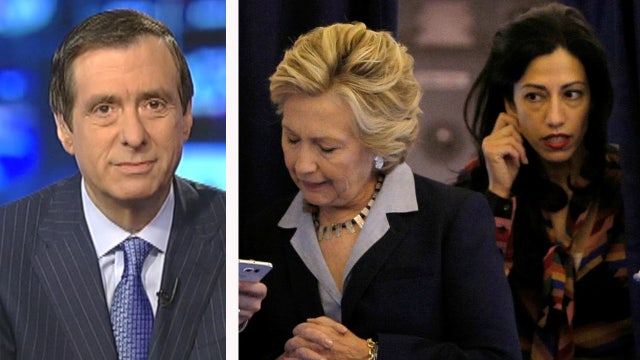Kurtz: The Hillary-Weiner-Huma plot twist
'MediaBuzz' host Howard Kurtz weighs in on the FBI re-opening the investigation into Hillary Clinton's emails and how Anthony Weiner may play a part in the scandal
Perhaps the most fascinating aspect of the FBI again investigating Hillary Clinton is the rather predictable partisan back-flips.
No sooner did we learn that James Comey had come up with new email evidence than Donald Trump—and some conservative commentators—came to a much more positive view of the FBI director. Before, he was running a “rigged” investigation and failing to do what any competent prosecutor would do, which was pursue criminal charges against Clinton.
Now he was a man of integrity standing up for truth, justice and the American way.
Meanwhile, the Clinton camp—and some liberal commentators—who had sung Comey’s praises when he declined to prosecute were now dismissing him as a partisan Bush administration hack throwing a monkey wrench into the campaign’s final stretch.
NYT columnist Paul Krugman: “If we don't hear more from Comey, we just have to conclude that he was trying to swing election. And *that* should be the story.”
For many of these folks, justice is served only when a law-enforcement official delivers the outcome you want.
The fact that the trail soon led to Anthony Weiner’s sexting of a teenage girl, as the New York Times was the first to report, just added to the surreal and quasi-comical nature of the whole extravaganza. Call it the Carlos Danger phase of the campaign.
As one pundit tweeted, the whole campaign seems to have come down to “Access Hollywood” and Weiner sexting.
Maybe Trump was on to something when he used to rail about how Weiner is a “pervert” and who knew whether his wife Huma Abedin, Hillary’s longtime confidant, was sharing classified information with him.
The media treated this like a bombshell, and rightly so, when it exploded on Friday afternoon. Even if it turns out to be a nothing-burger, it has utterly changed the media and political environment in a campaign in which Clinton seemed to be coasting.
But Comey was not “reopening” the original investigation, as NBC, the Washington Post, Politico and other outlets initially reported and then retracted. And as the story unfolded over the weekend, new details emerged that cast the Comey move in a less favorable light.
Comey apparently violated FBI policy against bringing a case or otherwise taking action against a politician in the 60 days before the election. I would give him a pass on that, since this case is so unique, but it does provide some pause.
The FBI chief said initially that the new evidence may not be “significant.” But Yahoo’s Mike Isikoff reported that the bureau, at the time, had not even reviewed the emails in question, lacking the requisite search warrant. So the emails could be a bunch of duplicates, and reports say they aren’t to or from Clinton.
Why, without knowing these critical facts, would Comey go public? The Post reported that he feared being blamed for a coverup if, after the election, the evidence turned out to be significant.
I can see why he had that concern, and he was in a no-win position. But that leaves him open to criticism that he bowed to pressure from within the bureau, or was more concerned with protecting his personal reputation than with interfering in a national election.
Clinton has decided to make Comey an issue, calling his move “unprecedented” and “disturbing.” Now she is is under the shadow of another FBI inquiry. Trump will be pounding away on this day after day. When I asked his campaign manager Kellyanne Conway on “Media Buzz” whether the new emails could turn out to be nothing, she acknowledged that but added that the probe reminds people of Clinton corruption.
My initial thought was that Comey has a responsibility to provide more information before Election Day. Now it’s clear he doesn’t yet have the information. And every day Clinton runs against him is a day she’s not solely focusing on Donald Trump.






















